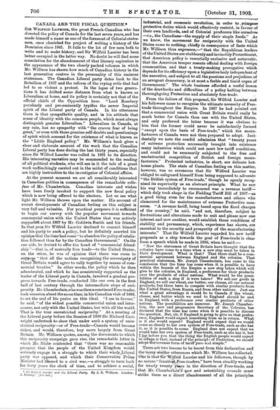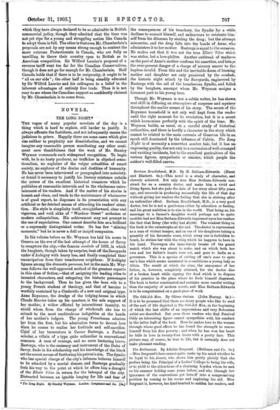CANADA AND THE FISCAL QUESTION.*
SIR WILFRID LAURIER, the great French-Canadian who has directed the policy of Canada for the last seven years, and has made himself a name as one of the foremost of Colonial states- men, once cherished the project of writing a history of the Dominion since 1841. It falls to the lot of few men both to write and to make history, and Sir Wilfrid Laurier has been better occupied in the latter way. No doubt he will find some consolation for the abandonment of that literary aspiration in the appearance of the two closely packed volumes in which Mr. Willison has shown how much of Canadian history in the last generation centres in the personality of this eminent statesman. The Canadian Liberal party dates back to the Rebellion of 1837 and the reform of the crying evils that had led to so violent a protest. In the lapse of two genera- tions it has drifted some distance from what is known as Liberalism at home, and its policy is certainly not that of the official chiefs of the Opposition here. "Lord Rosetery peculiarly and pre-eminently typifies the newer Imperial spirit of the Liberal party of Canada. In his utterances there is that sympathetic quality, and in his attitude that sense of identity with the common people, which must always distinguish genuine Liberalism." Liberalism in Canada, at any rate, has no sympathy with " the craven fear of being great," or even with those genuine self-doubts and questionings of spirit which account for the existence of what is known as the " Little England policy." Mr. William's book gives a clear and elaborate account of the work that the Canadian Liberal party has done during the last thirty years, especially since Sir Wilfrid Laurier was called in 1891 to its direction. His interesting narrative may be oommended to the reading of all political students, who will see in it the tale of a great work unflinchingly carried out in the midst of conditions that are highly instructive to the investigator of Colonial affairs.
At the present moment we are all considerably interested in Canadian politica in consequence of the remarkable volte- face of Mr. Chamberlain. Canadian interests and wishes have been freely invoked to support the new fiscal policy which is now being offered to the electors. Let us see what light Mr. Willison throws upon the matter. His account of recent developments of Canadian feeling on this subject is very full and valuable, For practical purposes it is sufficient to begin our survey with the popular movement towards commercial union with the United States that was actively supporte'tl about 1887 by Mr. Goldwin Smith and his friends. In that year Sir Wilfrid Laurier declined to commit himself and his party to such a policy, but he definitely asserted his opinion that the time had come to abandon the policy of retalia- tion followed thus far by the Canadian Government." On the one side, he desired to offer the hand of "commercial friend- ship "—that is, of mutually free trade—to the United States ; on the other, he was of opinion that there was room to stirspote " that all the nations recognising the sovereignty of Greatlaritain would agree to rally together by means of com- mercial treaties." In other words, the policy which he then adumbrated, and which he has consistently supported as the leader of the Liberal party in Canada, involved a gradual pro- gress towards Free-trade, conducted like our own in the first half of last century through the intermediate steps of reci- procity. Mr. Chamberlain,who WAS then a convinced Free-trader, took occasion about the same time, in his Canadian visit of 1888, to set the seal of his praise on this ideal. "I am in favour," he said, "of the widest possible commercial union and inter- course, not only with the United States, but with all the world. That is the true unrestricted reciprocity." At a meeting of the Liberal party before the Session of 1888 Sir Richard Cart- wright undertook to show that under such a system of unre- stricted reciprocity—or of Free-trade—Canada would become richer, and would, therefore, buy more largely from Great Britain. Mr. Willison quotes, among the documents to which this reciprocity campaign gave rise, the remarkable letter in which Mr. Blake contended that "there was no reasonable prospect that the people of the United Kingdom would seriously engage in a struggle to which their whole,Liberal party was opposed, and which their Conservative primp Minister had likened to a civil war,—a struggle to turn back for forty years the clock of time, and to achieve a social, • Sir Wilfrid Laurier and the Liberal Party. By J. S. Willison. London : J. Murray. L2.5s. net.]
industrial, and economic revolution, in order to , reimpose protective duties which would effectively restrict, in favour of
their own landlords, and of Colonial producers like ourselves —i.e., the Canadians—the supply of their staple foods." As we know, the movement for reciprocity with the United
States came to nothing, chiefly in consequence of facts which Mr. Willison thus expresses,—" that the Republican leaders of the United States are stubbornly and invincibly Protectionist, that American policy is essentially exclusive and autocratic, that the American temper resents official dealing with foreign communities, and that a treaty-making prerogative which depends for its efficiency upon a legislative body independent of the executive, and subject to all the passions and prejudices of an arrogant democracy, is at most a feeble and timid organ of Government." The whole business afforded a useful lesson of the drawbacks and difficulties of a policy halting between thoroughgoing Protection and absolutely free trade.
From the failure of this proposal, Sir Wilfrid Laurier and his followers came to recognise the ultimate necessity of Free- trade throughout the Empire. In 1887 he had pointed out that a commercial union with Great Britain would really be much better for Canada than one with the United States,
and only preferred the latter because it was obvious to him that the former could never be satisfactorily formed " except upon the basis of Free-trade," which the manu-
facturers of Canada were not then prepared to adopt. Inci- dentally we note the candid admission that " twenty years of extreme protection necessarily brought into existence many industries which could not meet low tariff conditions, and could not be summarily subjected to the free and unobstructed competition of British and foreign manu- facturers." Protected industries, in short, are delicate hot- house plants. The state of Canadian feeling on this matter, however, was so erroneous that Sir Wilfred Laurier was obliged to safeguard himself from being supposed to advocate " the British system of Free-trade," though he openly recog- nised its superiority as an abstract principle. What he saw his way immediately to recommend was a revenue tariff— which duly took shape in the Fielding Tariff Bill of 1897—as a good thing even for the manufacturers and others who clamoured for the maintenance of extreme Protective mea- sures. "A revenue tariff, being based upon the fixed charges of the country," he said, "and not, therefore, subject to fluctuations and alterations made to suit and please now one interest and now another, would establish these conditions of stability and permanency, which, experience has shown, are essential to the security and prosperity of the manufacturing interests." That Sir Wilfrid Laurier regarded his new tariff
proposals as a step towards the goal of Free-trade is clear from a speech which he made in 1896, when he said:— "Now the statesmen of Great Britain have thought that the colonies have come to a time when a new step must be taken in their development. What is that ? That there shall be a com- mercial agreement between England and the colonies. That practical statesman, Mr. Joseph Chamberlain, has come to the conclusion that the time has come when it is possible to have within the bounds of the Empire a new step taken which will give to the colonies, in England, a preference for their products over the products of other nations. What would be the possi- bilities of such a stop if it were taken? We sell our goods in England, we sell our wheat, our butter, our cheese, all our natural products, but these have to compete with similar products from the United States, from Russia, and from other nations. Just see what a great advantage it would be to Canada if the wheat, cheese, and butter which we send to England should be met in England with a preference over similar products of other nations. The possibilities are immense. Mr. Joseph Chamber- lain, the new and progressive Secretary of the Colonies, has declared that the time has come when it is possible to discuss the question. But, sir, if England is going to give us that prefer- ence, England would expect something from us in return. What is it she would expect ? England would expect that we would come as closely to her own system of Free-trade, such as she has it, as it is possible to come. England does not expect that we would take her own system of Free-trade, such as she has it, but I lay before you that the thing the English people would expect in return is that, instead of the principl of Protection, we should adopt-thv revenue form of tariff pure and simple."
There are-two lessons to be learnt from this declaration and the 'many similar utterances which Mr. Willison has collected. One is that Sir Wilfrid Laurier and his followers, though by no means " fanatiCia..Free-traders," have been steadily working for 'nearly twenty .years in the direction of Free-trade, and that Mr. Chambeilain'i new and astonishing crusade must strike them as a direct- abandonment of all the principles which they have always declared to be so admirable in British -commercial policy, though they admitted that the time was not yet ripe for a young and struggling nation like Canada to adopt them in full. The other is that even Mr. Chamberlain's proposals are, not by any means strong enough to content the more extreme Protectionists in Canada, who are fully as unwilling to throw their country open to British as to American competition. Sir Wilfred Laurier's proposal of a revenue tariff went too far for the Canadian Conservatives, though it does not go far enough for Mr. Chamberlain. Half Canada holds that if there is to be reciprocity, it ought to be " all on our side" ; the other half is being steadily educated by Sir Wilfrid Laurier and his colleagues to a belief in the inherent advantages of entirely free trade. Thus it is not -easy to see where the Canadian support so confidently claimed by Mr. Chamberlain is to come from.



















































 Previous page
Previous page